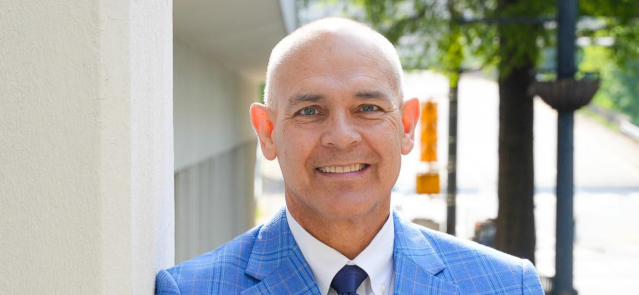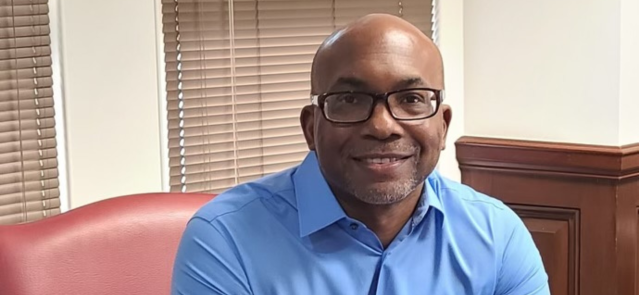Stay ahead of the curve as a political insider with deep policy analysis, daily briefings and policy-shaping tools.
Request a DemoSchools superintendent defends decision to drop AP African American Studies class, says it violates state law

Superintendent Richard Woods speaks at Grovetown High School. (Credit: Georgia Dept. of Education)
- State’s top education official says class on advanced class on African American studies violates state law
- Head of educators group said state law does not include AP classes
- Local school districts can decide if they want to finance and teach the course
Georgia School Superintendent Richard Woods said he dropped a college-level high school course about African American studies from the state’s class offerings because it violates a state law regulating the teaching of sensitive subjects such as race, gender, sex and history.
Woods’ explanation comes a week after educators, lawmakers, civil rights groups and other critics slammed him for not including an Advanced Placement African American Studies class as part of the 2024-25 school year curriculum. Critics called it an assault on students’ rights and educators’ ability to teach.
“After reviewing the content, it was clear that parts of the coursework did violate the law,” Woods said in a written statement that appeared on the Georgia Department of Education’s website. “As with most states with laws like Georgia on this issue that have raised concerns, the most glaring violation is on the topic of intersectionality. If the Advanced Placement course had presented a comparative narrative with opposing views on this and other topics, an argument could be made that the course did not violate Georgia law. For me, this has always been about following the law.”
Intersectionality looks at how a person’s gender, ethnicity and sexuality affect their access to opportunities and privileges.
The head of the state’s oldest educators group questioned Woods’ reasoning, saying the law does not apply to advanced placement courses.
“There is no answer for why this particular course is facing additional scrutiny,” Lisa Morgan, president of the 54-year-old Georgia Association of Educators, told State Affairs. “The right thing for Superintendent Woods to do is recommend this course for inclusion as a state-approved course and for the State Board of Education to approve that recommendation.
“The superintendent is continuing to place barriers between our students and a complete and honest curriculum dealing with the history of our country and the history of our world,” Morgan added. “And our students, particularly our high school students, are capable of dealing with these difficult topics.”
Woods’ decision is another means of blocking students from getting the full picture of American history, Morgan said.
“Our students deserve to be able to learn the full breadth of what has happened in our past,” she added. “Our students know that there were periods in our country that were very
harmful to people, and they are capable of discussing those periods of our history and learning from them.”
Woods, meanwhile, said local school districts can decide whether to finance and teach the class. He said students can take the AP test to possibly receive college credit. However, he noted the content may be challenged at the local level.
Approved advanced placement classes are paid for by the state. The African American studies course was the only advanced placement class not recommended by Woods.
The onus on whether to teach the class — which was in the pilot stage during the 2024-25 school year — now falls to local school districts. So does the controversy.
Local school boards will now “have to deal with these groups that want to impose their values and beliefs on all students,” Morgan said of activist groups.
State lawmakers passed House Bill 1084 — better known as the divisive concepts law — in 2022 amid heavy opposition from those who called the action an attack on “critical race theory,” paving the way for banning certain educational materials.
Critical race theory is a concept that the American Bar Association describes as “the practice of interrogating the role of race and racism in society that emerged in the legal academy and spread to other fields of scholarship.”
Proponents of Georgia’s law said it gives parents more power to monitor what is taught in public schools and potentially block what they view as harmful material from being taught to students.
Morgan wondered how Woods’ decision would impact students’ HOPE Scholarship chances and their advancement placement credits.
While Woods stands firm in his decision, he has asked for legal clarification on parts of the law.
“Should the ruling reverse my decision, then I will follow the law,” he said.
Related stories:
Have questions, comments or tips? Contact Tammy Joyner on X @lvjoyner or at [email protected].
Bruce Thompson, transformative Georgia labor commissioner and former state senator, dies at 59
ATLANTA, Nov. 25, 2024 — Bruce Thompson, Georgia’s labor commissioner and a dedicated public servant known for his transformative leadership and open-door policy, passed away yesterday after a battle with pancreatic cancer. He was 59. Thompson, a former Republican state senator and military veteran, was elected labor commissioner in 2022. He took office in January …
Newly minted Senate Minority Leader Harold Jones II: ‘I’m not the typical back-slapping politician’
Nearly 10 years into legislative life, Sen. Harold Jones II wouldn’t change anything about the experience. “I love every minute of it. Even when I hate it, I love it,” the 55-year-old Augusta Democrat told State Affairs. Come January, Jones will add another role to his legislative duties: Senate minority leader, a job held for …
Gov. Kemp calls on state agencies to be fiscally restrained amid record $16.5B surplus
The Gist Gov. Brian Kemp asked the state’s 51 government agencies for continued fiscal restraint when drafting their amended fiscal year 2025 and 2026 budgets. Most agencies adhered to his request even as the state’s general fund surplus hit a record $16.5 billion last month. Forty-five agencies, excluding state courts, followed the governor’s instructions to …
Georgia defies bomb threats as election chief declares a “free, fair and fast” vote amid record turnout
ATLANTA – Despite dealing with over 60 bomb threats, Georgia’s election chief said Tuesday the state’s general election went smoothly. Georgia had a record turnout with nearly 5.3 million people voting, Secretary of State Brad Raffensperger told reporters. Election officials in the state’s 159 counties have until 5 p.m. to certify votes. “We had a …




